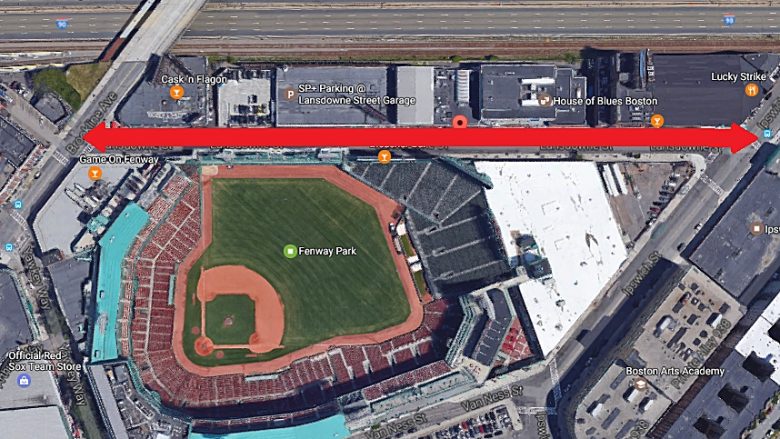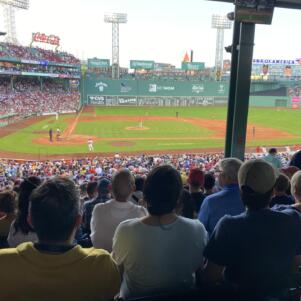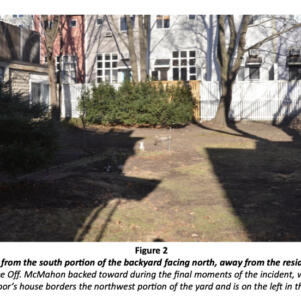ISIS Fears Prompt Street Closure Near Fenway Park
By Evan Lips | April 27, 2017, 21:18 EDT
 (Red line denotes Lansdowne Street)
(Red line denotes Lansdowne Street) BOSTON — Citing safety concerns, city officials announced Thursday they plan to close Lansdowne Street, a popular destination for fly balls clearing Fenway Park’s left field wall, to vehicular traffic during days and nights when the Red Sox are playing home games.
The precaution, however, has nothing to do with baseballs and broken windshields.
Officer Rachel McGuire, a spokesman for the Boston Police Department, told WBUR city officials enacted the policy “out of the utmost caution and concern for pedestrian safety” and not over a specific threat, but Police Commissioner William Evans alluded in his comments to WCVB-TV that the decision was made as a result of recent terrorist-driven truck attacks that have occurred overseas.
“The whole idea of whether a lone wolf or a terrorist driving anything into that crowd is a security risk to us,” Evans told the network.
In December 2010, the Federal Bureau of Investigation and the Department of Homeland Security issued a joint intelligence advisory detailing the rise of so-called “vehicle ramming tactics.”
“Terrorists overseas have suggested conducting vehicle ramming attacks — using modified or unmodified vehicles — against crowds, buildings, and other vehicles. Such attacks could be used to target locations where large numbers of people congregate, including sporting events, entertainment venues, or shopping centers. Vehicle ramming offers terrorists with limited access to explosives or weapons an opportunity to conduct a Homeland attack with minimal prior training or experience,” the advisory read in part.
The tactic later gained popularity among Islamic terrorist groups, including Hamas, in Israel. In response, the National Institute of Building Sciences updated in 2014 adopted building design guidelines that involve the use of bollards, which are “crash-and-attack-resistant” barriers “used to protect military and governmental buildings and domestic structures and areas of higher security levels.”
Boston police have indicated they plan to roll out a similar set of moveable barriers at both ends of Lansdowne Street prior to the start of Monday’s game versus the Baltimore Orioles.
The truck-ramming terrorist tactic has occurred several times in Europe, including the countries of France, Germany, and Sweden. On July 14, 2016, a 19-ton cargo truck driven by a terrorist killed 86 pedestrians in Nice, France. The Islamic State later claimed responsibility.
On December 19, 2016, a similar truck-ramming killed 12 and injured 56 at a Christmas market in Berlin, Germany. ISIS was later found to have provided the driver, a Tunisian failed asylum seeker identified as Anis Amri, with instructions.
Most recently, this past April 7, in Stockholm, Sweden a 39-year-old failed asylum seeker from Uzbekistan identified as Rakhmat Akilov killed four and injured 15 others after he drove a hijacked truck into a crowd of people standing outside of a department store. Uzbekistan officials later confirmed that Akilov was an ISIS recruit.
Two other streets that ring Fenway Park, Yawkey Way and Van Ness Street, already have limited or no vehicle access on game days.
In 2015, Massachusetts Inspector General Glenn A. Cunha criticized city leaders — specifically the Boston Redevelopment Authority — for approving in perpetuity a giveaway of Yawkey Way to the baseball team for their private use to sell food and apparel on game days.
The original 2003 deal saw the team reach a 10-year contract in which they agreed to pay the city $7.3 million for private use of Yawkey Way, a deal that worked out to about $6,000 per game day. Cunha later determined that the Red Sox generated an average of nearly $74,000 per game in revenue through the arrangement.
The subsequent 2013 deal resulted in permanent easements for the Red Sox on public ways near the park in exchange for payments far less than the easements were worth, the inspector general found.











